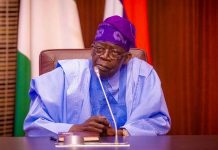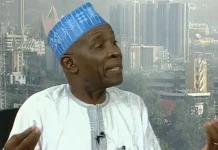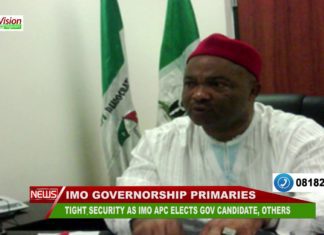Political activity in Nigeria is at an all-time high, about two years before the country’s next presidential election.
According to the Electoral Act, which clearly states that no sort of campaigning is permitted until 150 days before to the election, people and political parties are actively campaigning.
Many Nigerians fear that political leaders have turned their focus away from government and onto campaigning in preparation for the 2027 election.
The Independent National Electoral Commission, or INEC, the electoral authority tasked with carrying out its constitutional duty to control political party activity, is doing nothing to exacerbate the situation.
Similarly, the police, whose constitutional responsibility involves arresting and prosecuting individuals who violate the law, are ignoring impunity.
Last week, INEC chairman Prof. Mahmood Yakubu expressed concern that political parties had already begun running covert campaigns in spite of explicit rules limiting them to 150 days prior to the election.
Yakubu had brought attention to what he called a “disturbing trend” of political campaigning ahead of schedule during a one-day stakeholders’ roundtable on the difficulties of early political campaigns at the Electoral Institute in Abuja. This was particularly relevant in light of the 2027 general elections, the Federal Capital Territory Area Council elections, and the upcoming off-cycle governorship elections.
The Electoral Act 2022’s Section 94(1), which expressly forbids starting a campaign more than 150 days prior to election day and mandates that all campaign activities conclude 24 hours prior to the start of voting, was referenced by him.
He bemoaned, meanwhile, the fact that political actors frequently ignored this clause. “Even though the electoral commission has not yet released the schedule of polling operations, political parties, candidates, and their supporters appear to be in a permanent election mindset.
“We have witnessed rallies, media campaigns, and outdoor advertising promoting different political parties and candidates all over the nation,” he stated.
The commission’s ability to enforce campaign finance limits is seriously jeopardized by these premature activities, he warned, adding, “These actions and activities undermine the commission’s ability to track campaign finance limits as politicians, prospective candidates, and third-party agents expend large amount of money that cannot be effectively monitored before the official commencement of campaigns.”
Political circles have responded sharply to the development. Many Nigerians are concerned at the INEC chairman’s admission that the electoral umpire is powerless to stop the unattractive trend, especially those who have closely followed political events in Nigeria over the past two years.
Professor Yakubu noted that there is no penalty at all for campaigns conducted more than 150 days before to an election, despite the fact that Section 94(2) of the Electoral Act 2022 stipulates a maximum fine of N500,000 for campaigns conducted within 24 hours of an election.
“This presents a challenge for the Commission in handling early campaigns,” he said.
He said that although early campaigning is not a new problem, regulatory organizations’ inability to address it within the current legislative framework called for more careful consideration.
Some people, however, think that because the ruling All Progressives Congress, or APC, is heavily involved, INEC and the police are not doing much to stop the alarming trend.
The major opposition political parties are among the many people and organizations that have expressed worry over the nasty trend. They have warned that the 2027 election may already be deemed compromised unless immediate and drastic action is taken to halt the trend.
The African Democratic Congress (ADC) and the opposition Peoples Democratic Party (PDP) criticized the ruling APC as the greatest offender and demanded drastic measures to stop the practice.
The Socio-Economic Rights and Accountability Project (SERAP) has voiced its concerns and threatened to sue Yakubu’s INEC for failing to fulfill its constitutional obligations, in addition to urging INEC to punish early election campaigners.
The organization tasked Yakubu with identifying political figures and parties who are flagrantly breaking international norms, constitutional law, and statutes that forbid early election campaigns and guaranteeing their and their backers’ prosecution.
It also asked him to keep a close eye on political parties that are breaking this rule and to create explicit rules that will control how parties and politicians behave in relation to early election campaigns in Nigeria.
The Deputy Director, Kolawole Oluwadare, signed the letter from SERAP dated September 13 that contained this call.
When political parties, candidates, and other politicians violate the legally mandated election campaign period, INEC is not powerless, according to SERAP, which rejected the idea that INEC is powerless. Campaigns for early elections are unlawful and unconstitutional.
“INEC is tasked with punishing electoral offenses, such as early election campaigns, in accordance with its constitutional and legal duties.
Political parties, candidates, and other politicians should not be perceived by INEC as endorsing or legitimizing early election campaigns that take place outside of the constitutionally mandated campaign time.
SERAP cautioned that early election campaigns have a negative impact on the nation’s economic growth because of the protracted electioneering craze. The group bemoaned the fact that public funds are being wasted on such early campaigns at the expense of the populace by individuals in positions of authority, especially state governors.
Since INEC has not yet released the election schedule, early election campaigns are in conflict with the word and spirit of the Nigerian Constitution 1999 [as amended], the Electoral Act, and the nation’s commitments under international human rights law.
The windfall from fuel subsidies appears to be being used by a number of state governors for early election campaigns. Even though income has increased significantly since gasoline subsidies were eliminated, certain state governors are egregiously failing to provide their citizens with basic services and engage in social and economic growth.
It would be appropriate, justified, and proportionate to enforce the ban on early election campaigns since it would promote equality, freedom, and human dignity. It said, “INEC has extensive constitutional and legal responsibilities to advance, safeguard, and enforce the rule of law and protect the public interest.
The potential for creating a culture of impunity if the practice is permitted to continue was another issue raised by SERAP. It stated: “If INEC does not fairly enforce the country’s international human rights obligations and the constitutional and statutory prohibitions of early election campaigns, it will foster a culture of impunity for those who commit these crimes and their backers.”
The Nigerian Constitution, the Electoral Act, and the nation’s international human rights commitments are being violated, and INEC is tacitly endorsing these crimes by not taking action against or sanctioning political parties, candidates, and other politicians for running early election campaigns.
Therefore, we kindly request that the suggested actions be completed within seven days of this letter’s publication or receipt. SERAP will take all necessary legal steps to force you and INEC to abide by our request in the public interest if we don’t hear back from you by then.
Instead of focusing on providing their constituents with good government, state governors and other politicians are displaying campaign banners all across the nation in an attempt to win votes.
In order to direct political parties to immediately stop the practice, which is obviously against both the Nigerian Constitution and the Electoral Act, INEC may use section 83 of the Electoral Act to ask them for information or clarification on how they are adhering to the constitutional ban on early election campaigns.
According to section 83(4) of the Nigerian Constitution, INEC should punish candidates and political parties who disregard its directive.
Additionally, it ought to utilize section 225 of the Nigerian Constitution to require political parties to disclose the source or sources of finance used by their candidates and parties for early election campaigns.
Before the allotted 150 days under the Electoral Act, a number of political parties, candidates, and other politicians are advertising themselves and vying for votes. The law cannot be circumvented by political parties, candidates, or other politicians.
“The Nigerian Constitution’s chapters two and four, which address fundamental goals, guiding principles of state policy, and fundamental rights, are undermined by early election campaigns.”
In his contribution, Yusuf Shehu, a former Katsina State lawmaker, denounced the development and criticized the electoral board for doing nothing while politicians tamper with the nation’s electoral process.
“The Electoral Act and the Nigerian Constitution’s drafters never imagined that the political season would be an ongoing exercise,” he stated. The constitutional Code of Conduct for Public Officers should be followed by public officials, or else they risk legal repercussions.
In addition to acting for Nigeria’s development and well-being, as well as to uphold, defend, and defend the Nigerian Constitution, a number of candidates and other elected public officials have disregarded their constitutional oath of office.
Politicians, including a number of state governors, are putting election campaigns ahead of progress made in improving the socioeconomic standing of Nigerians, particularly the country’s underprivileged and marginalized populations.
Because early election campaigns unfairly favor incumbent or well-funded candidates, they erode transparency, fairness, and impartiality while also facilitating the diversion of public resources and interruption of public services, as well as people’ access to public goods and services.
The use of public resources for political reasons by elected officials would continue if political parties, candidates, and other politicians were not penalized for participating in early election campaigns. Additionally, it would generate conflicts of interest, contradict public service norms, and undermine the impartiality of public offices.
Human rights attorney Femi Falana has also requested in his plea that INEC arraign individuals who are breaking the laws prohibiting early election campaigns in court in order to serve as a warning to others.
During an appearance on Sunday Politics on Channels Television, Falana made the call.
He acknowledged that the constitution did not specify the proper sanction, but he disagreed with the INEC head, saying that “the law cannot cover all situations.” The legislators believed they were interacting with a civilized political elite. No.
The Constitution and the Electoral Act provide them the authority to enforce rules and regulations now that they are breaking the law.
It is necessary for INEC to bring charges against some of these individuals in court. Let them appear in court and apologize, saying, “There is no provision for punishment, my Lord.”
“If you disregard the court’s order, you have committed contempt and will be imprisoned.”
In order to address this gap, he added, the constitution gives INEC the authority to create rules and regulations, stating that “Section 95 empowers INEC to draft rules and regulations.” The Constitution’s Paragraph F, Part 1 gives INEC the authority to oversee campaigns in accordance with its established guidelines. In order to prevent this illegality, INEC should immediately implement rules and regulations, which it has not yet done.
The growing tendency of early election campaigns in Nigeria has also drawn criticism from former INEC chairman Prof. Attahiru Jega, who warned that if the issue is not handled immediately, it might seriously jeopardize the integrity of the 2027 polls.
Jega gave a keynote speech at an INEC-hosted stakeholders’ roundtable last week in Abuja to discuss the difficulties of early campaigns. Campaigns that were run outside of the legally mandated time frame gave some candidates undue advantages, weakened the rule of law, heightened political tensions, and solidified a climate of impunity among political players, he said in his keynote.
While pointing the finger at “matured Democrats” for early campaigns and election law infractions, he also pointed out that lawmakers benefited greatly from early campaigns and were thus unlikely to pass legislation that would penalize early campaigners more severely.
“Unwanted anomalies in democratic elections are early election campaigns. They violate the law, level the playing field unfairly, and could even lead to political unrest and conflict,” he said.
Join Television Nigerian Whatsapp Now
Join Television Nigerian Facebook Now
Join Television Nigerian Twitter Now
Join Television Nigerian YouTUbe Now





